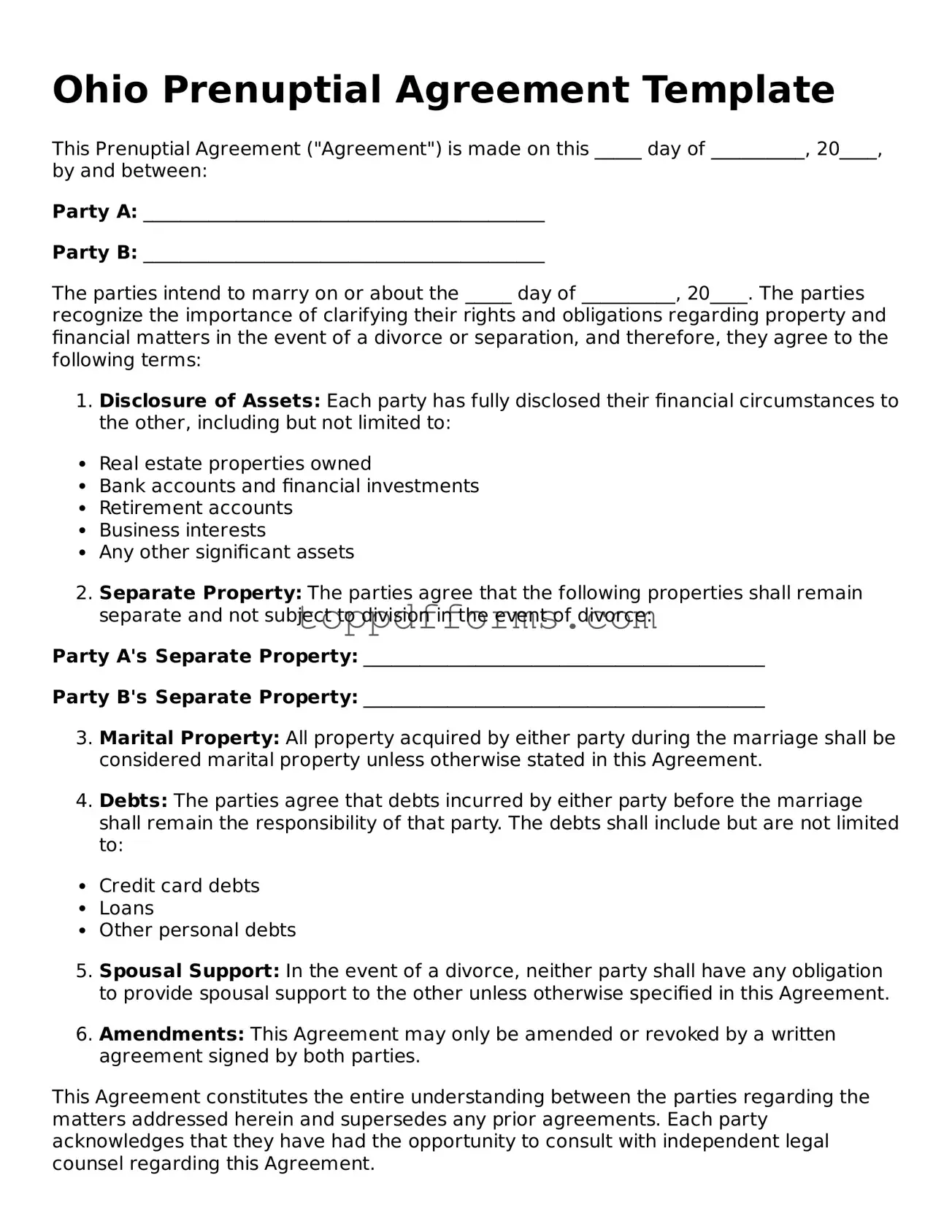Prenuptial Agreement Document for Ohio State
Things You Should Know About This Form
What is a prenuptial agreement in Ohio?
A prenuptial agreement, often referred to as a prenup, is a legal document created by two individuals before they get married. In Ohio, this agreement outlines the division of assets, debts, and other financial responsibilities in the event of divorce or separation. It can also address issues like spousal support. By establishing these terms in advance, couples can reduce uncertainty and potential conflict should their marriage end.
How do I create a prenuptial agreement in Ohio?
To create a prenuptial agreement in Ohio, both parties must fully disclose their assets and liabilities. It is advisable to draft the agreement with the assistance of legal professionals to ensure that it meets all legal requirements and is enforceable in court. The document should be signed by both parties, ideally well in advance of the wedding date, to avoid any claims of coercion. Once signed, it should be kept in a safe place, as both parties will need access to it in the future.
Are prenuptial agreements enforceable in Ohio?
Yes, prenuptial agreements are generally enforceable in Ohio, provided they meet certain criteria. The agreement must be in writing, signed by both parties, and entered into voluntarily. Additionally, it should not be unconscionable, meaning that it should not be extremely unfair to one party. Courts will review the agreement to ensure that both parties had a fair opportunity to understand the terms and that there was no fraud or duress involved in its creation.
Can a prenuptial agreement be changed or revoked in Ohio?
Yes, a prenuptial agreement can be modified or revoked in Ohio. Both parties must agree to any changes, and these modifications should also be made in writing and signed by both individuals. It’s important to note that any changes should be documented properly to avoid disputes in the future. Couples may choose to revisit their prenuptial agreement periodically, especially after significant life events such as the birth of a child or a substantial change in financial circumstances.
PDF Overview
| Fact Name | Details |
|---|---|
| Definition | A prenuptial agreement is a contract entered into by two individuals before marriage, outlining the distribution of assets and responsibilities in the event of divorce or separation. |
| Governing Law | Ohio Revised Code § 3103.05 governs prenuptial agreements in Ohio. |
| Enforceability | For a prenuptial agreement to be enforceable, it must be in writing and signed by both parties. |
| Full Disclosure | Both parties must provide a fair and reasonable disclosure of their financial situations for the agreement to be valid. |
| Voluntary Agreement | The agreement must be entered into voluntarily by both parties without any coercion or undue influence. |
| Legal Representation | It is advisable for both parties to seek independent legal counsel to ensure their interests are protected. |
| Modification | Prenuptial agreements can be modified or revoked at any time, provided both parties agree to the changes in writing. |
| Judicial Review | A court may review a prenuptial agreement for fairness and reasonableness at the time of enforcement. |
| Common Misconceptions | Many people believe prenuptial agreements are only for the wealthy; however, they can benefit individuals of all financial backgrounds. |
Common mistakes
When completing the Ohio Prenuptial Agreement form, many individuals overlook crucial details that can lead to complications later on. One common mistake is failing to fully disclose all assets and liabilities. Transparency is vital in a prenuptial agreement. If one party conceals significant financial information, it could render the agreement unenforceable.
Another frequent error involves not specifying the terms clearly. Vague language can create confusion and disputes down the line. It is essential to articulate the rights and responsibilities of each party regarding property division and debt responsibility. Clarity in these terms helps prevent misunderstandings.
People often neglect to consider future changes in circumstances. For example, if one partner plans to pursue a career change or if children are expected, these factors should be addressed. A well-drafted agreement anticipates potential life changes and outlines how they will affect the terms of the prenup.
Additionally, couples sometimes fail to have the agreement reviewed by independent legal counsel. Each party should have their own attorney to ensure that their interests are adequately represented. Without independent legal advice, there is a risk that one party may feel pressured into signing an agreement that does not serve their best interests.
Another mistake is not signing the agreement well in advance of the wedding. Waiting until the last minute can create stress and lead to hasty decisions. It is advisable to finalize the prenup several weeks before the wedding to allow both parties ample time to review and consider the terms.
Some individuals also overlook the importance of including a provision for dispute resolution. Specifying how disputes will be handled, whether through mediation or arbitration, can save time and money in the event of a disagreement in the future.
Finally, many couples forget to update the agreement after significant life events. Changes such as marriage, divorce, or the birth of children can impact the terms of the prenup. Regularly reviewing and updating the agreement ensures that it remains relevant and enforceable.
Other Common State-specific Prenuptial Agreement Forms
Michigan Prenup - A prenuptial agreement can create a clear understanding of asset division if needed.
For businesses looking to secure sensitive information, a comprehensive Non-disclosure Agreement form is crucial in maintaining confidentiality during negotiations and partnerships. This form not only defines the scope of protected information but also establishes the obligations of both parties in keeping shared secrets secure. For those interested, more information can be found on the significance of Non-disclosure Agreements.
Georgia Prenup - A prenuptial agreement can help map out plans for business interests.
